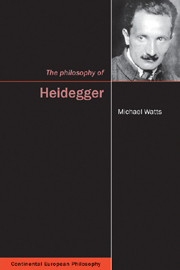Book contents
- Frontmatter
- Contents
- Preface
- Abbreviations
- 1 Heidegger's life
- 2 The meaning of life: the question of Being
- 3 The central ideas in Being and Time
- 4 Conscience, guilt and authenticity
- 5 Being-towards-death
- 6 Dasein's primordial temporality
- 7 The “truth of alētheia” and language
- 8 Heidegger on poetry, poets and Hölderlin
- 9 Heidegger on art
- 10 Heidegger on technology
- 11 Tao, Zen and Heidegger
- 12 Heidegger's politics
- Glossary
- Further reading
- Bibliography
- Index
3 - The central ideas in Being and Time
- Frontmatter
- Contents
- Preface
- Abbreviations
- 1 Heidegger's life
- 2 The meaning of life: the question of Being
- 3 The central ideas in Being and Time
- 4 Conscience, guilt and authenticity
- 5 Being-towards-death
- 6 Dasein's primordial temporality
- 7 The “truth of alētheia” and language
- 8 Heidegger on poetry, poets and Hölderlin
- 9 Heidegger on art
- 10 Heidegger on technology
- 11 Tao, Zen and Heidegger
- 12 Heidegger's politics
- Glossary
- Further reading
- Bibliography
- Index
Summary
Being and Time was Heidegger's first major publication. It was originally published in 1927 in Husserl's Jahrbuch für phänomenologie und phänomenologische Forschung and appeared simultaneously in a separate printing. A carefully constructed, tightly woven masterwork, it was originally intended as a preliminary text for a much larger project that was never completed. (Being and Time remained unfinished because Heidegger was in a hurry to get it published in order to obtain a full professorship, first at Marburg in 1927 and then Freiburg in 1928, and then in subsequent years his attention shifted during the change he called die Kehre [the turn].)
In Being and Time, Heidegger's investigation of the meaning of Being is carried out via an analysis of human existence. Heidegger does not separate the study of Being from the study of humanity because he believes that we cannot have one without the other, for, according to Heidegger, true thinking can take place only within the total relation of Being and man's nature. So Being and Time is simultaneously an analysis of our way of Being and an enquiry into the meaning of Being. Heidegger's approach to philosophical interpretation is based on his premise that when we philosophize we are attempting to reach a clearer understanding of something that is already vaguely familiar to us. So when he asks the question of Being he does so on the basis that we already understand Being in general, for it is this that allows us to raise questions about it.
- Type
- Chapter
- Information
- The Philosophy of Heidegger , pp. 39 - 80Publisher: Acumen PublishingPrint publication year: 2011

